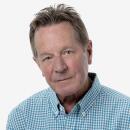Kenneth Arrow, Nobel Prize winner whose theories changed modern economics, dies at 95
Kenneth Arrow, the Nobel Prize-winning Stanford economist whose groundbreaking work redefined the world’s understanding of the free marketplace, has died at his home in Palo Alto.
Stanford University, where Arrow spent much of his career, reported that the economist died Tuesday at the age of 95.
Arrow was the youngest person to win the Nobel Prize for economics, and through the decades he helped push and pull economics into unexpected arenas — global warming, the electoral process, pay equity and healthcare.
His contributions to the so-called equilibrium theory helped him win the Nobel Prize in 1972, an honor he shared with British economist Sir John Hicks. Arrow was 51 at the time.
The equilibrium theory established what have become the standards for supply and demand in a competitive marketplace.
While once economics held a narrow understanding of the dynamics of a given marketplace — cost to make vs. the cost to purchase — Arrow was among a group that advanced a far more complex algorithm.
The equilibrium theory suggested that to accurately understand demand, one had to measure all the other forces in the economy. Demand for a meal, for instance, would rest not just on a menu price but on a whole galaxy of other factors — oil prices, wages, the cost of food, transportation. Equilibrium would only be achieved, he said, when the marketplace set a price where supply of a particular item was equal to its demand — a promised land of sorts where shortages or surpluses would be nonexistent.
Arrow also dove into healthcare, showing how it was a marketplace outlier. In a real estate deal, for instance, the buyer and seller would have access to the same set of facts. In healthcare, physicians and insurance companies know far more than the customer. The result, he said, was nearly a complete lack of competition.
Arrow first made his mark in economics in 1951 when he expanded on his own doctoral thesis with the “impossibility theorem,” which broadly suggested that no reasonably consistent and fair voting system can result in logical results when there are three or more choices, or candidates.
Born in New York City on Aug. 23, 1921, Arrow’s education was interrupted by World War II when he served as a weather officer in the U.S. Army Air Corps from 1942 to 1946. He returned to Columbia University after the war and earned his doctorate, then became an assistant professor at the University of Chicago before joining the Stanford faculty in 1949. He taught at Stanford until 1968 when he left to teach at Harvard University. He later returned to Stanford.
An affinity for economics ran in the family. His sister was an economist, as were both of his brothers-in-law. His nephew was former Treasury Secretary and Harvard President Larry Summers.
A prolific theorist throughout his life, Arrow was a believer in social justice, once writing to then-Israeli Prime Minister Yitzhak Shamir, pleading for an end to the Israeli-Palestinian conflict. He challenged Stanford to rethink its investments in apartheid South Africa and was one of the academics who signed a statement on climate change that detailed what they said were the disastrous consequences of global warming.
In an interview with the Atlantic magazine in 2009, Arrow worried that time was running short on confronting climate change.
“That’s not a theory; it’s happening right now,” he said. “That’s not a prediction; it’s happening right now.”
Arrow is survived by two sons, David and Andrew; a sister, Anita Summers; and a grandson. His wife, Selma Schweitzer, died in 2015.
More to Read
Start your day right
Sign up for Essential California for the L.A. Times biggest news, features and recommendations in your inbox six days a week.
You may occasionally receive promotional content from the Los Angeles Times.




